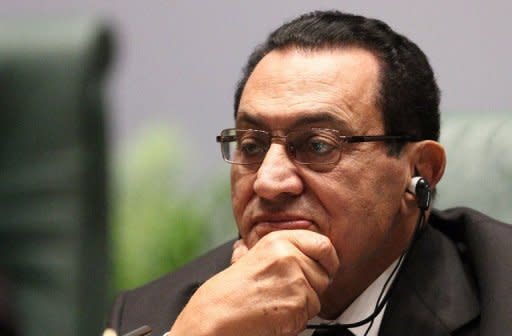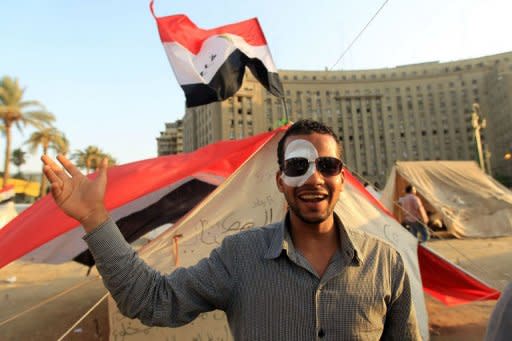Mubaraks to be tried in Cairo
Egypt's ex-president Hosni Mubarak's murder trial on August 3 will take place in Cairo, the state news agency MENA said Thursday, a move likely to appease activists but create a logistical nightmare. Mubarak, ousted in February by a popular revolt, has been under arrest in hospital in the Red Sea resort town of Sharm el-Sheikh, where he is being treated for a heart condition. "It has been decided that the trial of ex-president Hosni Mubarak and his two sons Alaa and Gamal ... will be held in the building of the General Authority for Investment and the free trade areas in the Cairo Expo grounds," MENA quoted a justice ministry official Mohammed Manei as saying. Health Minister Amr Hilmi told reporters Mubarak's health was "good" and that he was fit to be transferred to Cairo. But one of Mubarak's doctors told AFP they had received no warning that they should prepare for his transfer. Mubarak's transfer to Cairo was a key demand of protesters whose relations with the ruling military and government have strained in the past weeks partly over accusations that they are delaying trials of former regime officials. Tareq Khuli, a leader of the April 6 movement that has held a 20 day sit-in in Cairo's Tahrir Square to call for faster reforms, hailed the announcement but said his group would keep up pressure to make sure it is implemented. "It's a good step, and it is the result of public pressure," said Khuli. "We will continue the pressure to make sure this step is executed." Mubarak, 83, will stand trial with his two sons and his former interior minister Habib al-Adli, who are imprisoned in Cairo. Six police commanders are also included as defendants, as is a businessman close to Mubarak who fled the country and was arrested in Spain. Manei, an assistant to the justice minister, said chairs were being fixed in the hall for the expected audience and an "unprecedented security plan" would bring together soldiers and police for security. A cage for the defendants will also be installed, Manei told MENA. Defendants, dressed in white uniforms, are usually kept in black metal cages during court proceedings. Ahmed Mekki, a recently retired deputy appeals court head, said the exhibition grounds were used in the past by Mubarak himself to try Islamists accused of assassinating Mubarak's predecessor Anwar Sadat in 1981. "It is much larger than court rooms, and easier to secure," he said. Tareq al-Zumor, one of the Islamists who was tried and sentenced over the assassination, said he looked forward to attending the trial. "I hope to attend, to see Mubarak in the same cage I was in," said Zumor, who spent three decades in jail and was released after Mubarak's ouster. But it was not immediately clear whether Mubarak himself would appear in the cage. MENA said it was decided that Mubarak will be present at the trial, but previous decisions to transfer him to a Cairo prison or military hospital fell flat amid reports of his weak health. Mubarak has been abstaining from food, subsisting only on liquids and juice, doctors said this week. The former president suffers from a heart condition and is said to be extremely depressed since his spectacular fall from power. It was not immediately clear whether the trial would be aired live, as state television has begun doing with other trials of former regime officials. A section will be devoted to the press, but only Egyptian state television will be allowed to film. Tourism Minister Munir Fakhri Abdel Nur hailed the announcement, saying he had warned the government against holding the trial in Sharm el-Sheikh, one of the country's key tourist attractions. "I asked them to stay away from Sharm el-Sheikh. It seems that they have followed my advice," he told AFP. He said the trial and the inevitable demonstrations outside the court house would have "disturbed the small city." Mubarak is charged with ordering the shooting of anti-regime demonstrators during the revolt, abuse of office for illicit gains and squandering public funds. The justice minister has said Mubarak may be executed if found guilty of the murder charge.



